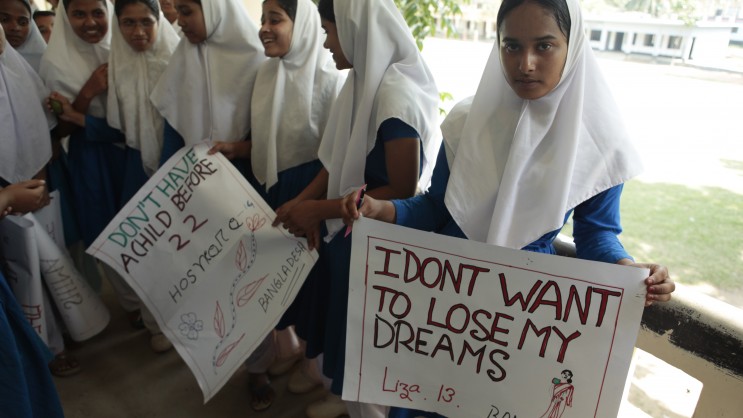Child marriage is a human rights violation and is illegal under international law. However, in some countries these laws are not enforced or exceptions are provided for parental consent or traditional and customary laws.
Child marriage is said to impact over 15 million girls a year, but Jude Thaddeus from the Organisation of African Youth says that this number could be underestimated. Thaddeus says that some girls are not aware that child marriage is a violation of their human rights and thus, girls are not able to report their cases to authorities.
“In some communities they don’t realise that the marriage of a girl that is under the age of 18 is a child marriage,” Thaddeus explained.
The Organisation of African Youth is a youth led organisation that looks to raise awareness around the issue of child marriages. They do this by reaching out to communities to talk to them about the adverse effects of child marriages.
Statistics show that 30% of girls in lower-income countries are married before the age of 18 and one in nine are married before the age of 15. In some circumstances, child brides are as young as eight or nine.
Child marriage affects every aspect of a girl’s life. Child brides usually drop out of school and housework, not homework, becomes their priority. Pressured to have children as soon as possible, girls risk dying during pregnancy and childbirth.
Married young girls are also more vulnerable to domestic violence and abuse. The likelihood that these girls might contract illnesses such as HIV and AIDS are higher as they are, in most cases, forced to marry much older men whom have already had sexual encounters with other people.
Cultural practices
Thaddeus says there are many reasons for children being forced into child marriages. In South Africa for example children are often orphaned and left to relatives who sell them. This practice is known as Ukuthwalwa.
Ukuthwalwa is the practice of abducting young girls and forcing them into marriage, sometimes with the consent of their parents or guardians. The practice occurs mainly in rural parts of South Africa and the girls who are involved in this practice are frequently under-aged.
“Some cultures believe that marrying a girl off at a young age helps to maintain her virtue and in other communities there is a need to generate income and marrying one daughter can provide income to the family,” Thaddeus continued.
Having one child married means that there is one less mouth or a family could possibly owe a debt to one person and in exchange for that debt to be cleared a girl could be given in the absence of a monetary payment.
“In situations where families experience some form of disaster this could lead to an increase in child marriage,” Thaddeus went further.
Political conflict
This could be seen in the case of the Syrian civil war. Families have taken to marrying their young daughters off to older men in the hopes that they would be looked after.
“It depends on the communities that the girls find themselves in and it is relative to the culture and the poverty in that community”.
The abduction of hundreds of schoolgirls in Nigeria last year and the rape, forced marriage, and sexual enslavement of girls in Iraq and Syria has put a spotlight on violence against girls in conflict.
The health consequences for victims are devastating. Child brides, for example, have twice the pregnancy death rate of women in their 20s, underscoring the need for specific responses in maternal and child health policies.
“While there has been a slow but growing trend to end violence against women, there is a real dearth of legislation that specifically tackles violence against girls. The world needs to wake up and remedy the situation urgently and comprehensively,” says Inter-Parliamentary Union president Saber Chowdhury.
Last year, the African Union launched a two-year Africa-wide campaign on child marriage. The AU has taken the lead to campaign governments to enact policies that will protect the rights of children.
Thaddeus says in order for a girl to escape such circumstances she needs to be made more aware that this practice is in fact illegal.
“It also depends on the support and the approach that organisations take in helping communities to alleviate this problem.” VOC (Umarah Hartley)






 WhatsApp us
WhatsApp us 

